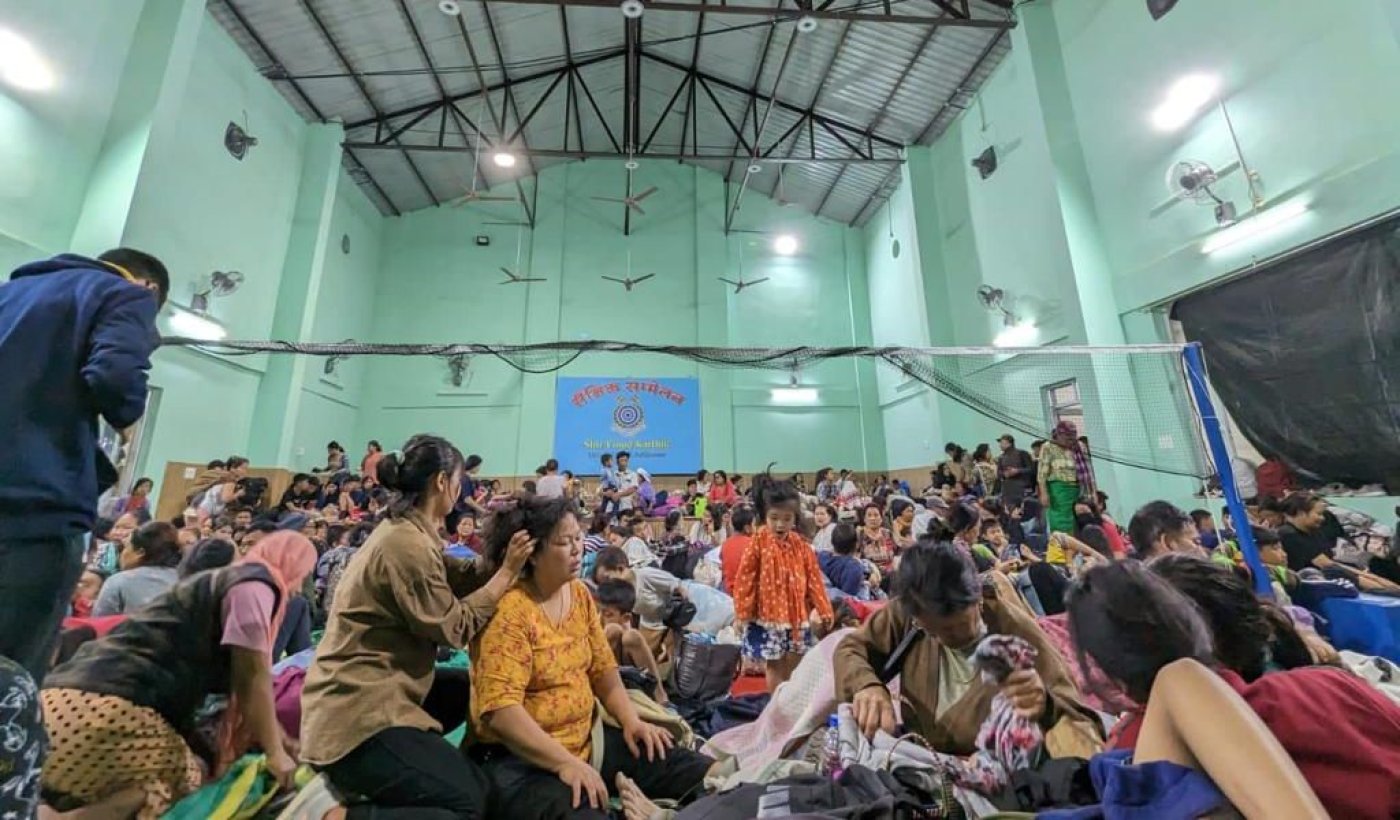Aizawl: For two nights on 4 and 5 May 2023, R (name withheld on request), a new mother from Manipur’s Meitei community, did not sleep, fearing there would be no escape from the mobs.
Holding her five-month-old daughter close as she paced a hall near a terrace on a three-storey building that security forces assigned as a temporary refuge in the southwest Manipur plains district of Churachandpur, she had only one thought.
“I thought to myself, how many can they kill? A few? 500? But not all of us,” said R, 34, a thin, soft-spoken woman who is a section officer at the National Institute of Electronics and Information Technology (NIELIT). “I kept thinking, I have to save my baby.”
R searched for a place she could hide if “they came”, referring to rioters from the Kuki-Chin tribes. Her plan was to hide on the terrace, where there was a water tank and a ladder leading up to it.
“I would climb the ladder to the water tank, and throw away the ladder,” said R. She considered calling a Naga friend and asking her to take the baby away. If the attackers came, she thought, she might die, but the baby would live because they would not know whose baby it was.
The section officer was one of many from Manipur’s majority Meitei in Churachandpur camped in the temporary shelter. Clashes between the Meitei and the Kuki-Chin after a peace rally called by the All Tribal Students Union Manipur (ATSUM) on 3 May to protest a move to give scheduled tribe (ST) status to the Meitei escalated into violence and murder.
Over the next three days, the mayhem that engulfed Churachandpur spread to nearby villages—a tribal forum said it was 100, but there was no independent confirmation—and the state capital, Imphal.
The death toll is now above 80, with 35,000 forced to flee their homes in the worst sectarian strife experienced in Manipur, one of India’s most diverse states with three major ethnic communities (Meitei, Kuki-Chin and Naga) divided into 33 recognised tribes speaking 29 languages. The epicentre of the violence was Churachandpur, a district of about 400,000, the majority tribal.
When this story was published, violence had erupted again after order had initially been restored, but Manipur’s long-festering ethnic fault lines had been laid bare, with few hopes, said many, of immediate healing.
Chief minister Nongthonmbam Biren Singh was accused of widening these cleavages over recent months, and the prime minister of silence after a month of violence and death.
On 28 May, fresh violence erupted ahead of a visit by union home minister Amit Shah, with more killed, paramilitary armouries looted, mobs back on the streets of many areas and about 200 homes burned. On 29 May, The Wire reported gun battles, deserted roads and hospitals struggling for supplies. Army action confirmed the disorder.
Acting on specific intelligence,Army mobilised in Sanasabi,Gwaltabi& Shabunkhol Khunao Vill in hilly region of YKPI,Imphal #Manipur.22 miscreants caught in act of burning houses apprehended,5x12 bore double barrel & 3 single barrel rifles, local weapons& war like stores recovered pic.twitter.com/gINOxxtRVx
— SpearCorps.IndianArmy (@Spearcorps) May 29, 2023
Entire communities appeared to have been cleansed from areas they once shared with other ethnicities. Those who fled homes and were interviewed for this story said they found the prospect of returning to live alongside former neighbours from other communities difficult to impossible, even as tribal legislators of the Manipur assembly and student organisations demand a separate state.
Scroll reported that 63 bodies were still lying in Manipur’s morgues because Kuki families felt unsafe to go into Meitei areas where they once lived and the Metei felt the same about Kuki area. The Indigenous Tribal Leaders’ Forum made a list of the Kuki dead alone, counting 44.
The presence of thousands of paramilitary forces and army columns, the army chief and the home minister had not restored peace, and while Shah was politely received, no assurances were given.
It’s total mayhem in #Manipur today, the 26th day of violence. So many casualties and many villages burnt to the ground. This is despite the central forces storming into the Manipur since weeks. When will you speak, Mr Prime Minister? pic.twitter.com/Uy8yHifJGb
— Angellica Aribam (@AngellicAribam) May 28, 2023
On 31 May, when the home minister sought a 15-day peace in Manipur, promising a judicial probe headed by a retired Supreme Court judge, and asked Kuki militants to lay down arms, Muan Tombing, general secretary of the Indigenous Tribal Leader Forum, told Article 14 his response to Shah was that Kuki arms were licensed.
“We, the village volunteers, have to defend our villages,” said Tombing. “That is our reply. If they (the Meitei) don’t attack, we don't attack, they attack, then we have to defend.”
‘Trust Has Been Completely Decimated’
Cohesion was lost even in the monolithic BJP, when seven of its Kuki members of the legislative assembly (MLAs) joined three other Kuki MLAs in demanding a separate Kuki state, accusing Biren Singh’s government of tacitly supporting the Metei.
“Trust has been completely decimated and eroded among the communities and the scars and wounds will be deep and painful,” wrote Karma Paljor, editor of EastMojo, an independent website.
Of Manipur’s 3.3 million people, around 53% are Meitei, mostly Hindu but also Buddhist, Sanamahist (an animist, ancestor-worshipping religion that predates Hinduism) and Muslim, who live in the Imphal Valley, which occupies 10% of the state’s area. The Meitei are not allowed to buy land in the hills.
The other 40% from diverse tribes—the majority Christian—live in the hills. They include Kuki and Naga. Many are STs, listed in the Constitution as eligible for affirmative action in education and jobs.
“The MLAs cutting across political parties and ideologies are now running around like headless chicken (sic) in their attempts to come across as leaders of their community, while seemingly forgetting that they are members of the Manipur Legislative Assembly, not a Kuki Assembly or a Meitei Assembly,” wrote Paljor.
After four days, when R was on her way home, she came across many men, women and children who were ill, some paralysed. Some were stroke patients and some needed urgent care. The sight of these people and the despair in their eyes made her cry.
“I can still remember their faces, I can still see the fear in their eyes,” said R. “Till now, I am in trauma, I sometimes dream that people are attacking us.”
Half a month after home minister Amit Shah and Biren Singh, both from India’s ruling Bharatiya Janata Party (BJP), on separate occasions said that things were “under control” in Manipur, violence, murder and arson have rebounded.
A mob blocked a highway on 11 May, others burnt houses at Torbung and Gobindapur in Bishnupur district on 14 and 24 May, a man was shot dead, while a state minister’s home was vandalised on 25 May, a union minister’s home was attacked on 26 May, when the government extended till 31 May the suspension of Internet services, bringing the cessation to a record 29 days, and two BJP MLA’s homes were set upon by a mob on 28 May.
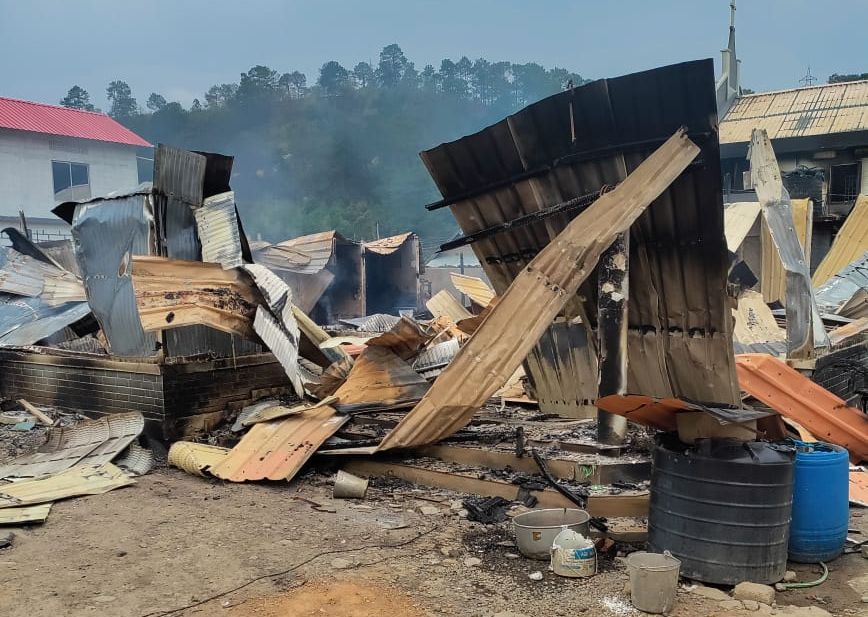
Tribals & Metei Lived & Worked Together
Before the current orgy of violence, Manipur’s communities lived and worked together, despite the state’s ethnic cleavages.
Since 2015, R had been teaching at NIELIT, which provides free computer courses to scheduled caste and ST students in Churachandpur, living in a home provided by the institute on campus, with students and teachers who were tribals and Meitei.
On the afternoon of 3 May, she was resting in her home, thinking about going home to Bishnupur district, around 23 km to the east. When she heard of the ATSUM protests, she did not think much of them, until she got a frantic call from her husband, a paramilitary officer currently serving in Jharkhand.
“I started getting phone calls from my family, asking what are you still doing there,” said R. They told her many protesters had started burning Meitei houses. At 8 pm, she called a friend, who whispered to her that he was hiding in a tribal friend’s house. Then, he started to cry.
R had no friends or relatives in Churachandpur. Afraid that her creative thoughts to save her baby would not work, she, like other Meiteis in town, fled to a nearby camp of the paramilitary Assam Rifles.
“People were outside, they were trying to throw stones even inside the camp,” she said. “We were not feeling safe. The police who were taking us in were very few.” The troopers were focussed on protecting the gate, as rioters tried to break through, she said.
Run into the buildings and hide, the troopers told her and other refugees. No help came, and there was no evacuation. All night long, R could see protestors and what she thought were tribal militants with guns and womens with sticks in a frenzy at the gates.
Trying her best to avoid the crowds, she slept with her baby on a third-floor corridor of the building. Despite her best efforts, her daughter cried through the night. “There were around 20-30 babies in the camp and most of them got sick,” said R. “The nursing mothers did not have enough food to eat and could not feed their babies properly.”
R’s baby was among those that had fallen ill. There were no signs of recovery, which she attributed to the unhygienic conditions and lack of sleep. The bottles she used to feed her daughter had started smelling foul.
On the morning of 6 May, R was able to arrange a room where her child could recover with medication and some sleep. On 7 May, the women in the camp started protesting, saying they would not eat until nursing mothers and the ill were sent home, as they were that afternoon.
After four sleepless nights, one at her home on campus and three nights in the camp, R reached her ancestral house in the village in Thinungei, 39 km south of Imphal.
R, who believed the peace was disturbed by “some fighters from outside Manipur”, said while she would be willing to return to work, she did not see a future where she and her child would ever return to Churachandpur.
“We feel very bad because we lived together for so many years,” she said.
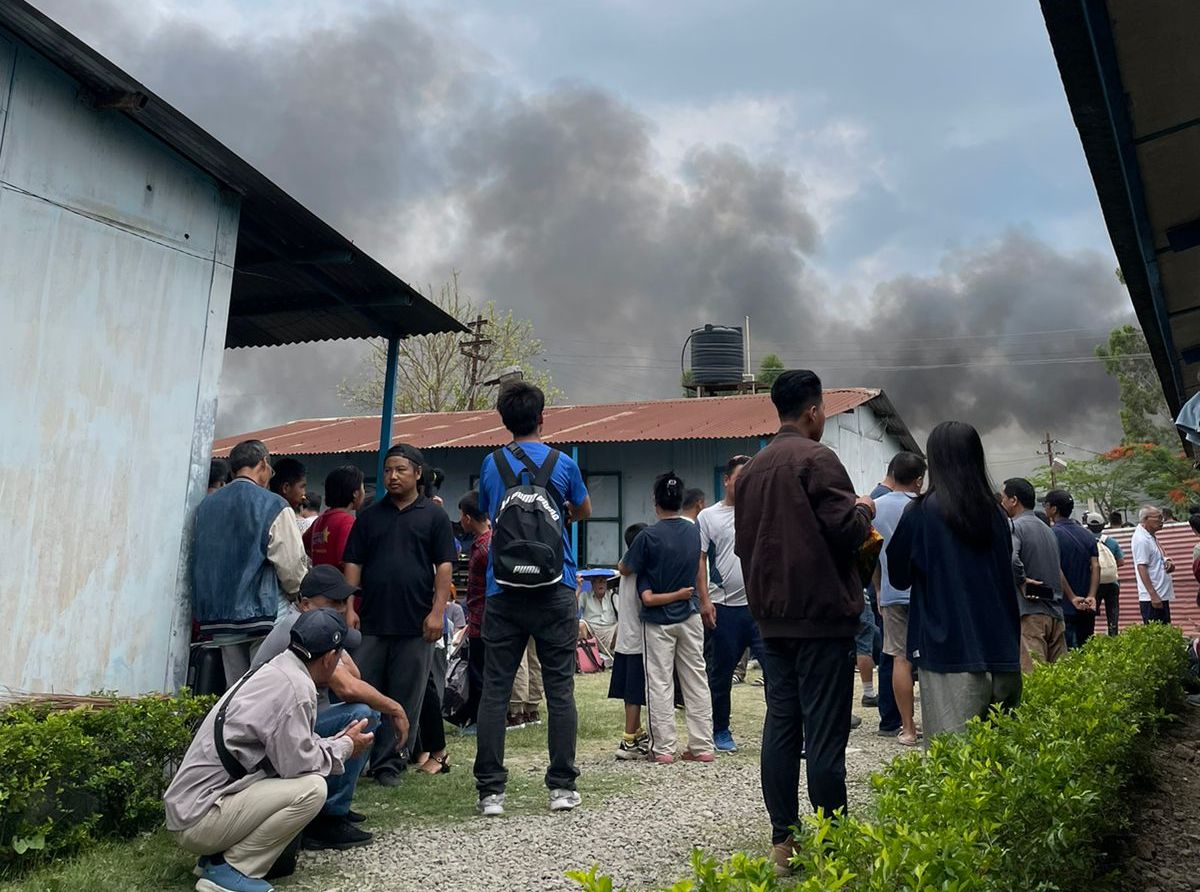
Govt Blamed For End Of Detente
Around the same time that R was fleeing to an Assam Rifles camp, L, a Kuki research scholar from Delhi’s Jawaharlal Nehru University, was trying to soothe her one-month-old in a crowded paramilitary camp around 60 km north of Churachandpur in Imphal’s West District. She had no food or water.
“As I sat there with my baby in my arms, I saw smoke in the air, our churches were burning in front of us,” said L (name withheld on request), 31, a young mother with deep set eyes and jet black hair, who had come to Imphal to visit her parents and have her baby vaccinated.
“Aeroplanes were flying in, but there was no help,” she said. “Every time we heard a gunshot or tear gas, we held our bags close, ready to run.” The room where L sat was sweltering and filled with the sounds of praying people and wailing babies.
It took two days for L and her son to find a flight ticket and flee to the first available safe city she could think of, Kolkata in West Bengal. She later sought refuge with relatives in Shillong, Meghalaya, and said she was unsure if she or her parents would ever return to their home in Imphal.
The stories of L and R are just two among thousands of horror stories that emerged from the state’s orgy of death and destruction.
A tense coexistence has always marked Manipur’s diverse communities, but that fine balance was upset, many said, over recent months by the actions and words of Biren Singh and his government.
In June 2022 and earlier this year in February 2023, the government evicted some Kuki villages that officials said were in reserved forests. Biren Singh has called those clearing trees in the hills above the Imphal Valley—including Chin refugees of the same ethnicity who had fled violence in neighbouring Myanmar—“foreigners” and “poppy planters”.
“They are not human beings,” Biren Singh once said.
Kukis have protested this characterisation. The tension escalated when mainly Kuki protestors organised a “tribal solidarity march” in 10 districts on May 3 to protest an April 19, 2023 Manipur High Court direction to the state government to consider the inclusion of the Meitei in the ST list. On 17 May, criticising the high court order, the Supreme Court said the court could make no such recommendation.
The tribal march degenerated into violence after unknown men set an Anglo-Kuki War Memorial Gate in Churachandpur afire, ending with death and injury to both Kuki and Meitei, with houses, churches, temples and schools burned.
Many of those Article 14 spoke to had the same question: where were the law enforcement agencies? Each person recounted either a delay in the arrival of the police or inaction to pleas for help.
On 17 May, Article 14 called and emailed Manipur’s director general of police P Doungel, with a reminder on 29 May, over allegations of inaction, but there was no response. We will update this story if he responds.
On 6 May, Doungel had said “the situation has improved”, but that assessment was premature. Until the end of the month, the army was evacuating civilians, escorted by drones, mine-proof vehicles and heavily armed soldiers.
Army & Assam Rifles undertake rescue operations in Kakching distt #Manipur. UAVs, Mine Protected Vehicles, QRTs tasked to ensure safe move of 2000 civilians from Serou to Pangaltabi in vehicles. 328 civilians moved from Sugnu to Sajik Tampak(1/2)#ManipurRescue@adgpi pic.twitter.com/ygMlQ7uGS5
— SpearCorps.IndianArmy (@Spearcorps) May 29, 2023
‘A Failure Of Law Enforcement’
Mangalleima, a Meitei and Australian migrant, had come to visit her hometown, Churachandpur, with her 11-year-old daughter when her family received news on the night of 3 May that their village, Khumujamba Meetei Leikai, one of 12 Meitei villages in Churachandpur district, was about to be attacked by a Kuki mob.
They were sitting on the first floor of the family home when through their bay window they saw smoke and fire in the distance. The neighbouring village, it emerged, has been set alight.
“It felt like the entire sky was red,” said Mangalleima, who only used one name. Her village mobilised for the attack. Children, women and the elderly hid inside homes, while men mobilised with sticks, knives and some licenced rifles.
When the attack came, the attackers were met with gunfire. They, too, fired guns. Mangalleima held her daughter close, trying to protect her from bullets that she feared might barrel in through the window.
Scared it might be their last conversation, her shivering 11-year-old turned to her and mumbled, “I never said this, but I love you mummy.”
Mangalleima’s head was filled with questions when we talked to her, questions that many repeatedly echoed.
The riot started around 7 pm that night, but till 3 am, there was no help from the police or security forces. “How long does it take for the army to come down from Imphal to Churachandpur (a distance of 63 km) to protect the people?” asked Mangalleima.
“This is not just our story,” said Mangalleima. “As much as the Meitei are affected, the Kuki are also affected. What are we gaining from this fight? It is a failure of the law enforcement.”
There were clear warning signs, she said, that the police and the government should have heeded. On 27 April, hundreds of tribals, incensed at government surveys of nearby forests to determine encroachment and ownership, set a gym in Churachandpur ablaze a day before chief minister Biren Singh was to inaugurate it.
The next day, prohibitory orders were imposed in Churachandpur and the Internet was suspended for five days. On 3 May, more than 60,000 turned up for the Tribal Solidarity March organised by the All Manipur Tribal Students Union, the proximate starting point of the current violence.
Others, too, alleged that the police did not react as they should have, when it was clear the situation in Churachandpur was on a knife’s edge.
‘My House Was Burned In Front Of Me’
S, a 33-year-old Meitei resident of Churachandpur, who works at a bank and spoke to Article 14 on condition of anonymity, said he called district officials and the superintendent of police (SP) when his house was set on fire.
“My house was burnt down in front of me,” said S. “They (the police) didn’t even pick up calls.”
To S’s relief, the fire brigade picked up his call, but the person at the other end of the line told him there was nothing they could do.
“The strange thing is, the police station is less than 200 m away, but they did not come,” said S.
“No one came to my office regarding this,” Churachandpur SP Karthik Malladi told Article 14, reacting to accusations of police inaction. “You can send them to my office if they need to talk to me.” Malladi did not respond to further questions.
There were reinforcements available in Moirang, a 30-minute drive away, but there was no evidence they were sent. An army unit, a km away, did come to their assistance but at around 1:30 am, more than five hours after calls for help.
Despite losing his home, S said that Churachandpur, the town where he was born and raised, was close to his heart. His memories of his childhood were vivid. He spoke of the familiar streets, the schools and their family grocery shop.
But the memory of his house in flames disturbs him “day and night”, said S. “I don't know why this thing happened—when there is a peace protest, why were they not shouting against the government, why were they shouting against the community?” asked S. “If any policy is not acceptable to the ASTUM, why did they not fight the government?”
The former Churachandpur resident, who now lives in a refugee camp in Moirang, said the tribals and the Meitei have suffered in lands the other dominated, the Meitei predominantly in Churachandpur and Moreh, and the Kuki mainly in Imphal.
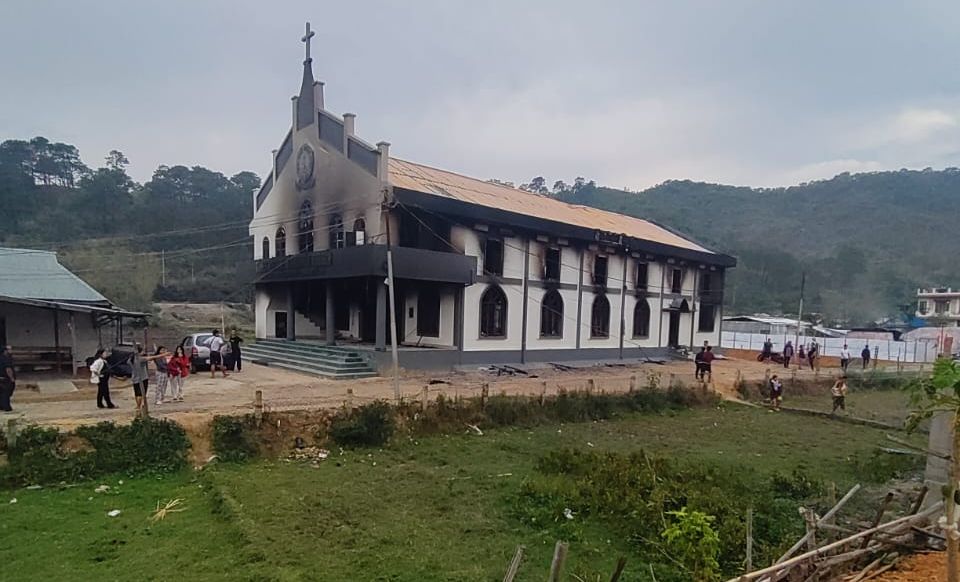
‘The Police Did Nothing’
“If the police had acted from the beginning they would have stopped it,” said M (name withheld on request), a 33-year-old Kuki lawyer, who lived in the upper-middle-class neighbourhood of the National Games Village in Imphal West and watched churches burn. “Where did the police go?”
The lawyer believed the only reason his house was spared was because they had a Meitei neighbour. “They already knew which houses belonged to the Chin-Kuki community, they already planned it ahead of time, because the moment [the violence] erupted, the execution was almost clinical,” said K. “They knew whom to attack and whom not to attack. It was not just a mob, there was somebody leading it.”
K (name withheld on request), a 36-year-old Kuki government officer in Imphal said their home was attacked at 3:30 am on 3 May, by which time many had fled to an army camp. “The only reason why I did not move was because I thought that the colony was safe,” said K, speaking on condition of anonymity.
“After all, my house was near the house of the DGP, additional DGP and MLAs. At least 30 police were already there,” said K. “The security was tight. I thought even if they come, the police will lead them away, but I was wrong; when they came, the police did nothing. They just watched.”
When his building was attacked by a mob of about 150 to 200, K and five others escaped through the back door of a neighbour’s house. His car, television set and other belongings were destroyed or damaged beyond repair.
Meitei mobs and militants, Kukis alleged, burned churches in neighbourhood after neighbourhood in Imphal, with police nowhere to be seen. In Churachandpur, it was the Meitei who were the target of Kuki-Chin militants and mobs, Metei alleged.
The denouement of Manipur’s violence has been that communities who once lived together now find the prospect of life beside one another difficult. S, the Meitei banking official from Churachandpur, said he would not return, despite the memories he holds close to his heart. The Kuki lawyer from Imphal also said he did not plan to return.
These attacks enlarged divides to the point that even media were judged based on their allegiances.
No sign of narrowing of #Manipur #kuki-#meitei rift. Now, #kuki organisations are calling for banning imphal valley-based media houses, accusing them of spreading fake news and pro-Meitei propaganda https://t.co/yT9g4WSary
— স্নিগ্ধেন্দু Snigdhendu (@snigspeak) May 29, 2023
“Our source of income, our house, everything is gone,” said S, the Churachandpur bank official, who now lives on charity.
“It's not like the line has been cut, it has been destroyed from the root,” said S. “I have to start from scratch.”
‘No CM As Provocative As Biren Singh’
While many blamed the arson and murder on police failures, others blamed chief minister Biren Singh and his government for instigating the ethnic tensions.
“This communal tension between Kuki, Naga or Meitei has been existing since time immemorial, even though we live as neighbours,” said D J Haokip, general secretary of the Kuki Students’ Organisation. “And though we have been living together since time immemorial, no chief minister has been provocative like Mr N Biren Singh.”
Haokip said his community had been alienated from the majority Meitei after the chief minister called them “foreigners, immigrants, and poppy planters”. “What happened this time would not have happened if we had a different chief minister.”
Some Kuki survivors of the violence said Biren Singh was the first to call Kukis Myanmarese, a reference picked up (here and here) by the Bharatiya Janata Yuva Morcha (BJYM), the youth wing of the BJP.
“He (Singh) is the one who lit the match,” said the Imphal lawyer we previously referred to. “I had earlier filed some FIRs against BJYM communal posts. The police didn’t register an FIR.”
BJYM state secretary Rojit Chongtham denied communal bias. “We always stand for our whole Manipur (sic) and whole community,” Chongtham told Article 14. “We are working on bringing peace only.”
Chongtham said he was hopeful for peace after home minister Shah’s visit to Manipur. “We are going to bring peace very soon in Imphal,” said Chongtham. “Churachandpur district will aso be coming in peace (sic) very soon."
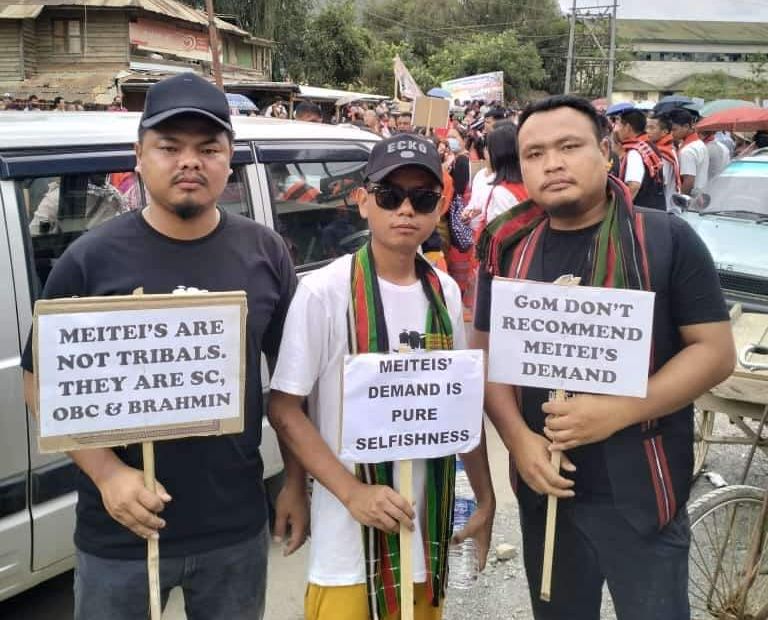
Support For The CM Among The Meitei
Many of the chief minister’s comments, as we said, have blamed Kukis for growing poppy, a narcotic. For instance, on 2 May, the chief minister said on Twitter, “These are the people who are destroying our generation. They are destroying our natural forests to plant poppy, and further igniting communal issues to carry out the drug smuggling business.”
Others said poppy was indeed being grown by some Kukis as a livelihood, but there had been no effort to zero in on those who ran the poppy trade.
Two months after the chief minister began his War Against Drugs in 2020, Thounaojam Brinda, a decorated officer of the Manipur Police, alleged that he had “pressured” her to let off an arrested drug lord.
“The drug business in the state thrives on alleged support and involvement of a combined force of politicians, militants, drug lords and officials,” said Brinda, who in June 2020 was charged with contempt of court for criticising the judiciary. She resigned in 2021 and unsuccessfully contested elections in 2022.
The chief minister has primarily blamed militants for the violence. “The clashes were not between two communities but between security forces and “Kuki militants,” Biren Singh said on 28 May, announcing that security forces had killed 40 armed militants over an unspecified period.
On 30 May, chief of defence staff Anil Chauhan contradicted the chief minister when he said “the situation (in Manipur) had nothing to do with counter-insurgency and is primarily a clash between two ethnicities”.
Article 14 sought comment from Biren Singh, calling his office on 26 May and sending an email on 29 May but there was no response.
Singh’s stand appeared to have widespread support among the Metei, including the intelligentsia. A 30-year-old Metei policy analyst from Imphal, speaking on condition of anonymity, said while he was not a fan of the chief minister, Singh was focussing on the “right issues”.
“He targeted the war on drugs and poppy cultivation under the direction of the central government,” said the policy analyst, accusing Kuki civil society groups of belligerence. “He also worked on protecting the reserved forest areas, not just in Kuki areas but in areas where Meiteis live too.”
“From the Kuki community, they called for ‘solution first and peace later,’ but the Meiteis called for ‘peace first and solution later’,” he said, alleging that the main funders of the drug business were Kuki militants.
‘Finish Them Off’
Two Meitei fundamentalist organisations, the Arambai Tenggol and the Meitei Leepun, variously implicated in the violence, used language hostile to tribals, much of it amplified on social media.
“Cut down the forest, dry up the rivers, finish them off; meanwhile let's build a homeland, we suffered homelessness since God's time,” Pramot Singh, the head of Meitei Leepun wrote on 28 April. “...this is our time… let's annihilate our traditional rival (sic) on the hills and live peacefully thereafter”.
The animosity has festered for decades, with periods of tension and violence interspersed with calm. While chief minister Singh is blamed for the most recent provocations, tribal representatives pointed to previous attempts to change laws that they said were detrimental to their interests.
For instance, they point to three bills introduced in the state assembly on 31 August 2015: The Protection of Manipur People Bill, and two amendments: The Manipur Land Revenue and Land Reforms (7th Amendment) Bill and The Manipur Shops and Establishments (2nd Amendment) Bill.
Tribals in Manipur feared the bills would encourage non-tribals to move to tribal areas and buy land. They were also fearful of losing citizenship as the Protection of Manipur People Bill set 1951 as the cut off year to determine citizenship.
“The three anti-tribal bills were during Congress rule but then Okram Ibobi Singh (the former chief minister), he was anti-tribal in his conduct… but he was not as provocative as Biren Singh,” said Haokip.
Tribal protests erupted in September 2015, and nine died when police opened fire. Yet, tribals did not feel demeaned as a community then, Haokip said, as they did now. Many now see separation as the only solution, which the union government is unlikely to even consider, even as home minister Shah listened to Kuki civil-society organisations during his visit.
“Since there already exist (sic) a vertical split between the Hills and Valley Dwellers—emotional, and now physical and geographical—separate administration is inevitable,” said the preface of a 120-page document on “state-sponsored ethnic cleansing” by the Zomi Students’ Federation and the Kuki Student’s Organisation.
“The separation has occurred at all levels, not by choice, but by imposition by the Meitei and their state government,” said the document. “... [it] is the only way to ensure a level playing field for the flourishing of (sic) all communities in peace harmony…”
Ethnic Tensions Predate Independence
The ethnic tensions that pervade Manipur can be attributed to the pre-Independence era. The states of the Northeast have endured many border conflicts due to borders set by the colonial administration, dividing people without consideration of ethnicities.
“(Henry) McMahon drew the 550-mile (890-km) boundary between India and its eastern and northern borders—including China, Burma, parts of the boundary with Bhutan in the west to 160 mile (260 km) east into the Brahmaputra valley—and never really understood that he was dividing people of the same ethnicity and cultures,” wrote journalist Patricia Mukhim in the National Herald.
The Kuki, who originated in the Lushai hills of Mizoram, share the same ancestry with the Chins of Myanmar, the Mizos of Mizoram, and the Kukis of Bangladesh.
Tension between the Meitei and tribals has simmered for more than five decades, since the Hill Areas Committee, a constitutional body representing the interests of tribals, officially demanded limited self-governance in 1974 under the Sixth Schedule of the Constitution, applicable currently to parts of Assam, Mizoram, Tripura and Meghalaya.
The recent violence has brought to prominence these artificial boundaries, which could not apparently suppress the divisions of tribe and language, said observers. Even elected representatives of the same party are splitting from their long-standing colleagues.
“The unabated violence that began on 3rd May 2023 in Manipur perpetrated by Majority Meiteis tacitly supported by existing Government of Manipur against Chin-Kuki-Mizo hill tribals has already partitioned the state and effected a total separation from the state of Manipur,” said a statement issued by the 10 tribal MLAs, including as we said three from the BJP, who demanded a separate state on 12 May.
Similarly in the opposition, Metei legislators stood by their own, as former MLA and Manipur law minister, Okram Joy Singh of the Congress party made clear his loyalties, accusing the 10 tribal MLAs of “misconduct”.
“They should be expelled from the house,” Okram Singh said. “This is the failure of the law and order situation (sic) caused by political instability. Mr Biren (Singh) has also regretted (the violence), apologising that it was because of lack of intelligence and failure of his government.”
Despite the tensions of the decades, and before the immediate orgy of violence and death, Manipur had made considerable progress over the past decade.
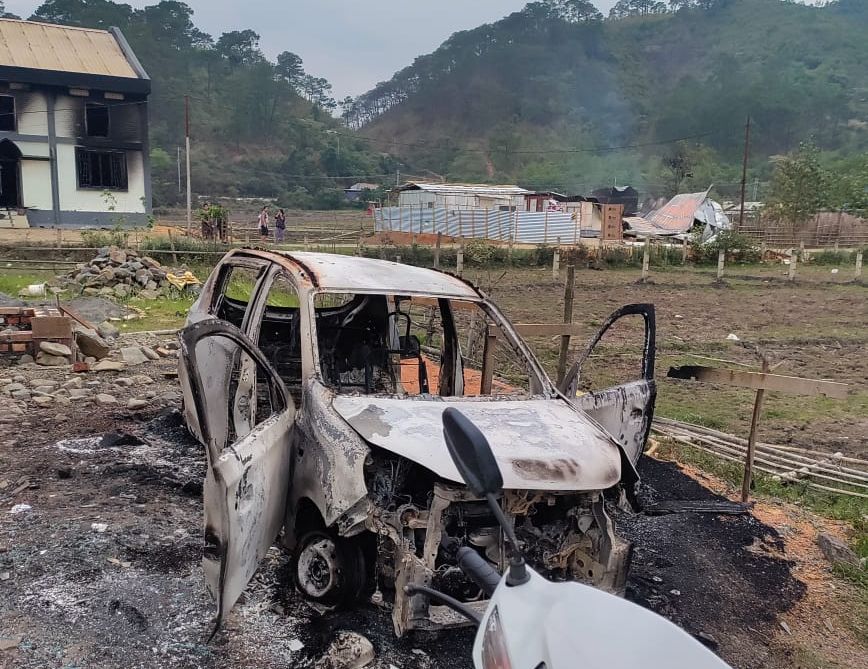
Progress, Amity Is Threatened
In his New Year message, chief minister Singh termed 2022 a year of progress and achievement for Manipur. In 2023, the state hosted a G20 summit of world leaders in February, its first tri-national international football tournament in March and the grand finale of the Miss India pageant in April.
Manipur’s literacy rate at 77% was higher than the national average in 2011, the latest available census data, as was the sex ratio. Manipur’s population is 0.24% of India’s but it supplies a disproportionate number of India’s athletes, especially football players, boxers, archers and weightlifters.
Meitei and tribal victims from both communities told us about the regret they felt about the recent violence setting Manipur back. S, the Meitei bank official we referred to previously, spoke of Kuki friends who continued to “pray for me”. S said he wanted peace to prevail and Manipur to be “as fine as before”.
“But that one night pulled Manipur back by 20 years,” said S. “All that was built up is lost.”
K, the Kuki government officer from Imphal, agreed. After living most of his life in other parts of India for work and education, he returned to Imphal a year ago, hoping to contribute to his home state.
“We love Imphal,” he said. He spoke of its nightlife, ice-cream parlours, long rides at 1 pm and “bonding between Meitei and Kuki kids”. K said while they were aware of a growing radicalisation of Meitei society, it did not bother people like him.
“It was on social media (the radicalisation) and some jobless people and unknown fake profiles, but we were never bothered, we were having a good time,” said K. “We never knew the extent to which it would go… its magnitude has completely convinced us, ministers, MLAs and the common person, to believe that we are not wanted.”
“We are not welcome, we don't belong, that conviction is so clear,” said K. “After all these years, Manipur has not been able to bring together all identities where we can all say that Manipur is ours.”
‘Why Are You Still Silent?’ Modi’s Silence Is Noted
The silence of prime minister Narendra Modi has been apparent to Manipuris.
“What is most surprising is that till date the double engine government of Modiji (a reference to BJP governments in Imphal and New Delhi) has not made a statement on what is happening today,” said Babloo Loitangbam, director of Human Rights Alert, an advocacy group. “The honourable PM does not have five minutes to spare and make a statement, this is very strange.”
Loitangbam echoed the widespread feeling that if the government wanted, it could have stopped the violence from escalating. “The government of India has the machinery to stop it in not an hour at least in two days' time,” he said. “They fight back China, they can fight back Pakistan, but they cannot handle a few young men with guns in their hands and a few angry groups running amok? It’s unimaginable.”
From the day violence erupted in Manipur on 3 May, Modi has talked about his visits to Australia, Papua New Guinea and Japan, he has shared messages about projects and programmes and a few birthday wishes on his social media platforms. There has been no word on the death and destruction in Manipur.
On 22 May, Alana Golmei, a lawyer, spoke for many when she addressed a note to the Prime Minister on Twitter. “Why are you still silent? Isn't Manipur as important as the rest of the states of this nation?” wrote Golmei. “Our dreams are now shattered and our futures are uncertain. This is not the Manipur we want to see… only some weeks ago, the future looked bright and now, we see sorrow and hopelessness all around.”
“Say something, we need your intervention,” said Golmei. “In fact, do something and rise up to your responsibility as a leader. It is your sworn duty to intervene and render help. If we cannot count on you now, (then) when?”
(Kimi Colney is a reporter for East Mojo based in Aizawl.)
Get exclusive access to new databases, expert analyses, weekly newsletters, book excerpts and new ideas on democracy, law and society in India. Subscribe to Article 14.

